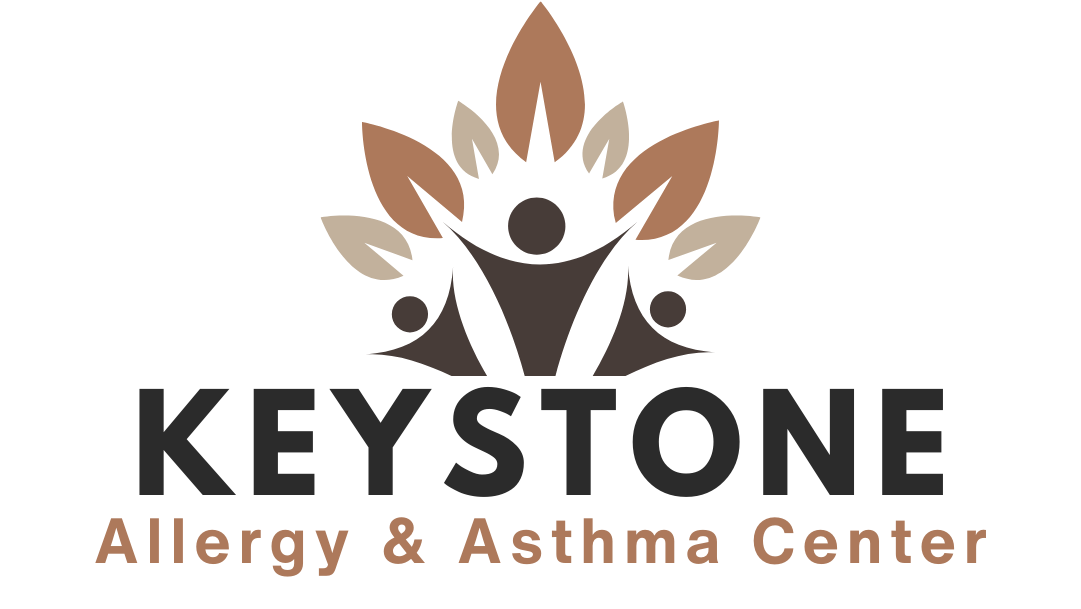Your Exton Area Chester County Allergist, Keystone Allergy and Asthma Center – 310 Exton Cmns, Exton, PA , Call or Text Us 484-897-7143
Chronic itching (pruritus) — where you feel the urge to scratch day after day — can be more than just a nuisance. It often reflects underlying changes in nerve signaling, inflammation, or skin barrier damage. At Keystone Allergy & Asthma Center in Exton, PA, we see patients of all ages across Chester County who struggle with persistent itch. This article helps explain why chronic itching occurs and offers topical treatments that may bring relief while you seek a tailored care plan.
🔍 Mechanism of Chronic Itching (Simplified)
While acute itch (like a mosquito bite) is often temporary, chronic itch engages more complex pathways. According to research published in the Journal of Allergy and Clinical Immunology, chronic pruritus often involves:
-
Neural sensitization / peripheral neural upregulation
-
Repeated scratching or inflammation triggers nerve endings in the skin to become more sensitive (lower threshold for activation).
-
Ion channels and receptors (e.g. TRPV1, TRPV3) and neuromediators (e.g. substance P) are upregulated in chronic itch states.
-
-
Cutaneous barrier dysfunction & inflammation
-
Damage to the skin barrier (due to eczema, xerosis, irritants) allows allergens, irritants, and microbes to penetrate more easily.
-
This leads to release of cytokines and neuroimmune signals that further stimulate itch.
-
-
Neuroimmune cross-talk
-
Immune cells (mast cells, eosinophils) release mediators (histamine, proteases) that activate nerves.
-
Conversely, nerves release peptides that influence immune cell behavior.
-
The loop of “itch → scratch → inflammation → more itch” is a key driver of chronic itching.
-
Because of these overlapping pathways, effective management often requires multi-pronged therapy: barrier repair, anti-neural treatments, and anti-inflammatory or antipruritic topicals.
🧴 Topical Treatments to Consider (Under Guidance)
These are generally supportive therapies. Always consult your dermatologist or allergist (like at our Exton clinic) before starting, especially on sensitive skin or for children.
| Topical | How It Helps | Notes & Cautions |
|---|---|---|
| Topical capsaicin | Desensitizes nerve endings by depleting substance P over time; reduces itch signaling | Usually low concentration (0.025–0.1%); use with caution around eyes, broken skin, or sensitive areas |
| Topical antihistamines (e.g. diphenhydramine, doxepin cream) | Blocks histamine at local nerve endings | Risk of local sedation or absorption; short-term use best |
| Moisturizer / emollients | Restores skin barrier; reduces xerosis-triggered itch | Use fragrance-free, thick creams or ointments; apply while skin is still damp |
| CeraVe Itch Relief products (or similar ceramide-based itch creams) | Combine barrier repair (ceramides) + itch-relief ingredients | Good for regular maintenance in dry climates (e.g. Chester County winters) |
| Salicylic acid topicals (low-dose formulations) | Helps exfoliate and reduce scaling or hyperkeratotic areas that can irritate nerves | Use low concentrations (0.5–2%) to minimize irritation; avoid on cracked/bleeding skin |
Important: These treatments may relieve symptoms but do not replace evaluation. If itching is severe, persistent (> 6 weeks), spreading, or associated with systemic symptoms (weight loss, liver disease, etc.), further investigation is warranted.
🏥 How an Allergist / Specialist (In Exton, PA) Can Help
At Keystone Allergy & Asthma Center, our approach to chronic itching includes:
-
A full medical history & skin/ examination (to assess contributing factors: eczema, allergies, systemic disease)
-
Allergy testing (where appropriate) to identify triggers
-
Prescription therapies (e.g. topical steroids, calcineurin inhibitors, or systemic treatments)
-
Monitoring and adjusting therapies, especially in patients with co-existing asthma, allergies, or sinus disease
Because chronic itching involves overlapping neuroimmune and barrier pathways, a specialist can integrate treatments in a safer, more effective manner than trialing OTC products alone.
✅ Tips for Patients in Chester County / Exton Area
-
Keep nails trimmed or use protective bandages to prevent skin damage from scratching
-
Use lukewarm water (not hot) for baths; limit to 5–10 min
-
Apply moisturizer within 3 minutes of showering
-
Avoid known irritants (fragrances, harsh soaps, prolonged washing)
-
Use humidifiers in winter (Chester County indoor air tends to be dry)
-
Document when itch worsens (weather, stress, workload) and share with your provider
🗺️ Local Care from Keystone Allergy & Asthma Center
If you’re suffering from persistent itch that doesn’t respond to over-the-counter creams, the team at Keystone Allergy & Asthma Center in Exton, PA is here for you. We serve patients across Exton, Malvern, West Chester, Downingtown, and all of Chester County.
Book a consult so we can evaluate your symptoms, identify triggers, and tailor a safe, evidence-based plan — one that might include some of the topicals listed above plus more advanced therapies.
Your Exton Area Chester County Allergist, Keystone Allergy and Asthma Center – 310 Exton Cmns, Exton, PA , Call or Text Us 484-897-7143
📍 Visit us in Exton, PA — your local specialist for allergy, asthma, and itchy skin concerns
